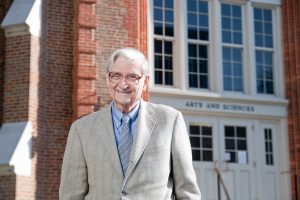
TUSCALOOSA, Ala. — International biodiversity experts will join Dr. Edward O. Wilson, a University of Alabama and College of Arts and Sciences alumnus, for the Edward O. Wilson Biodiversity Symposium, three days of research presentations and forums on the state and future of biodiversity on the planet.
The symposium will be held April 22–24 on the UA campus and is part of Edward O. Wilson Week at UA. Wilson is a 1949 and 1950 UA graduate and is one of the most highly decorated scientists in the world.
It will include presentations by internationally recognized scientists and authors working at the forefront of biodiversity research as well as a poster session by University of Alabama graduate student researchers.
The symposium will be held in The Zone of Bryant-Denny Stadium, and attendance requires advanced registration.Wilson will be one of some 15 scientists making presentations at the conference. His topic will be “How Humans and Ants Conquered the World.”
The first day of the conference is Earth Day, and Wilson will deliver the symposium’s plenary address, “The State of Global Biodiversity” that evening, April 22, at 7 in the Concert Hall of the Moody Music Building on the UA campus.The plenary address is free and open to the public.
The symposium’s sponsors include: the Curtis and Edith Munson Foundation, UA’s offices of the president, academic affairs and research, and the College of Arts and Sciences.
Wilson will also launch the international release of his new book, “A Window on Eternity: Gorongosa National Park, Mozambique,” as part of the conference and will hold a book signing following his address. “A Window on Eternity” tells the story of how one of the most biologically diverse habitats in the world was destroyed, was restored, and continues to evolve—with more than 50 stunning, full-color photographs by world-class wildlife photographer Piotr Naskrecki.
Alabama conservation and environmental organizations will pay a special tribute to Wilson, “Alabama’s Biodiversity: Inspiring A New Century of Discovery,” April 23 at 7 p.m. in the Concert Hall of the Moody Music Building on the UA campus. Alabama biodiversity experts will present their work and discuss Wilson’s influence on it. Admission is a minimum donation of $10 to the Edward O. Wilson Biodiversity Fellows Endowment at UA. The event is presented by more than 20 Alabama conservation and biodiversity organizations and The University of Alabama’s College of Arts and Sciences.
Wilson is a two-time Pulitzer Prize winner and the author of 29 influential books, including “Sociobiology: The New Synthesis and The Diversity of Life.” He won the Pulitzer Prize for his books “The Ants” and “On Human Nature.” He is honorary curator in entomology and university research professor emeritus, Harvard University.
He is the leading expert on ants and one of the world’s leading experts on evolution and species diversity.Wilson’s theories have sparked decades of debate about the interface between the human psyche and human biology.
Wilson is known as the founder of the theory of sociobiology, which proposes that human and animal behavior is shaped by evolutionary forces and which greatly influenced the development of its offshoot, evolutionary psychology. He developed the basis of modern biodiversity conservation efforts through his biophilia hypothesis, which proposes that there is a vital, instinctive bond between humans and all other forms of life.
Throughout his life, Wilson has spearheaded efforts to preserve the world’s biodiversity. He played a central role in establishing the Encyclopedia of Life, which has the goal of curating a web page for every one of Earth’s species, and he has mobilized the movement to protect the world’s “hot spots,” the realms of highest biodiversity on the planet.
A Birmingham native, Wilson chronicled his childhood sloshing through the woods and creeks of south Alabama in his bestselling 1994 autobiography, “Naturalist.” He received his bachelor’s and master’s degrees in biology from The University of Alabama and his doctoral degree from Harvard University where he is also Pelligrino University Research Professor Emeritus and where he taught and conducted research for 45 years.
For more information on the symposium and how to register, visit biodiversity.ua.edu.
Contact
Becky Florence, director of college relations, UA College of Arts and Sciences, 205/348-8663, rflorenc@as.ua.edu; Chris Bryant, UA media relations, 205/348-8323, cbryant@ur.ua.edu
Source
Dr. Patricia Sobecky, professor and chair, UA biological sciences, 205/348-1807, psobecky@ua.edu